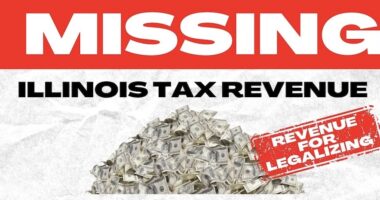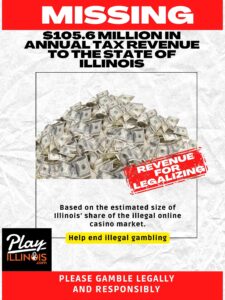Illinois Is Losing $105 Million In Taxes Annually By Not Legalizing Online Casinos


By not legalizing online casinos in Illinois, the state could potentially be missing out on up to $105 million in tax revenue each year.
The Innovation Group produced a study for the American Gaming Association which reveals that the United States loses over $4 billion in taxes annually due to people placing bets on illicit black market online casino sites. This study was released in November 2022.
Additionally, when considering all illegal gaming activities such as online casinos, sports betting, and unregulated gaming machines, the AGA estimates:
Illegal and unregulated operators receive over $510 billion a year from Americans’ bets. This results in a loss of $44.2 billion in gaming revenue for the legal industry and $13.3 billion in tax revenue for state governments.

Almost two-thirds of that total is derived from illegal online casinos.
Unlicensed and illegal operators who defy regulations siphon off revenue from the regulated market. This results in a decrease in tax revenue that states depend on to fund crucial public programs, including education and law enforcement. This disruption also hampers the substantial economic gains associated with regulated gaming. The tax loss scale is massive, with over half of all potential state gaming tax revenue being lost to unregulated operators.
Illinois accounts for illegal online casino handle of $1.65 billion annually
Now, let’s do some calculations.
Seven online sportsbooks are already established in the Prairie State of Illinois, with more anticipated to launch soon.
The reluctance to legalize online casinos in Illinois is sometimes rooted in the incorrect assumption that Illinois residents are not already wagering on illegal, unregulated online casinos.
The AGA study, which surveyed the gambling habits of over 5,000 Americans, suggests otherwise.
The estimate suggests that around $91.8 billion is bet each year via illegal online casinos by residents of the 12 midwestern states. This leads to approximately $3.7 billion in revenue being seized by the black market solely in the Midwest.
Officially, the Midwest comprises 12 states, with Illinois having the highest population among them.
- The population of Illinois is 12.67 million.
- Ohio — 11.8 million
- Michigan — 10 million
- Indiana — 6.8 million
- Missouri — 6.2 million
- Wisconsin — 6 million
- Minnesota — 5.7 million
- Iowa — 3.2 million
- Kansas — 2.9 million
- Nebraska — 2 million
- South Dakota — 895,000
- North Dakota — 775,000
The total population of the Midwest states is around 69 million, with Illinois making up about 18% of the population across the 12-state region.
An 18% share of $91.8 billion bet on illegal online casinos, along with $3.7 billion in lost revenue, equals:
- $1.65 billion in handle
- $660 million in revenue
In 2022, Illinois’ average tax rate for online sports betting was 16% of the revenue. If this rate is applied to the estimated $660 million revenue lost to illegal online casinos in Illinois, it equates to about $105.6 million in taxes lost to the black market. This is a significant amount that could have contributed to the state’s funds.
In conclusion, that’s significant revenue for a state in need of it.

Illinois clearly needs the money
Like most states, Illinois is desperately in need of additional revenue.
USGovernmentSpending.com data shows that Illinois has the nation’s fifth highest debt, approximately $65 billion. However, the state’s debt is relatively low when compared to its gross state product, making up only 6.6%.
However, The Pew Charitable Trusts have reported that from 2005 to 2019, Illinois was among eight states where the expenses surpassed the revenue. Furthermore, Pew stated that Illinois could only run for slightly more than 27 days on its existing balances.
Meanwhile, Illinois carries one of the heaviest state and local tax burdens in the US, with its tax burden ranking seventh highest at approximately 12.9%.
Illinois holds the position of having the second highest unfunded pension debt as a percentage of state personal income in the nation, at 19.2%. This is one of the reasons why revenue generated from the upcoming Bally’s Chicago casino is being allocated to the city’s police and fire pension funds.
This implies that Illinois requires substantial revenue without increasing taxes. There are already seven online sportsbooks in operation in Illinois. Moreover, six of them provide both online casinos and sportsbooks in the seven North American regions where both are allowed.
Illinois is recognized as a well-established market for online gambling. It ranks as the second largest revenue-generating sports betting market and the third largest in handle within the US.
Therefore, adding online casinos would be a quick and easy method for the state of Illinois to generate substantial revenue.
Regulating online casinos also protects Illinois citizens
Above all, legalizing and regulating online casinos in Illinois not only generates necessary income from an activity that is currently happening unlawfully, but it is also the most effective method to safeguard consumers.
The AGA said:
The legal gaming sector is one of the most strictly monitored industries in the U.S. This includes various regulations ranging from financial solvency and licensing requirements to customer identification and anti-money laundering rules. Legal gaming operators and suppliers adhere to numerous laws and regulations, all aimed at safeguarding consumers and instilling confidence in the gaming market.
Unregulated and illegal gambling operators disregard all of these standards, putting consumers at significant risk and weakening the economic and tax benefits brought by the legal gaming industry.
The problem is, some customers struggle to distinguish between legal and illegal online casinos. According to the AGA report, 90% of gamblers stated that betting on a legal site was crucial for them. However, unlicensed online operators frequently claim to be legal, causing widespread confusion.
Furthermore, individuals who engage in illegal betting have no financial safeguards and may inadvertently be contributing to broader criminal endeavors such as organized crime, money laundering, drug trafficking, and violent offenses.
This underscores the necessity for licensing, regulating, and controlling online casinos in Illinois, provided that the legislation incorporates stringent requirements for responsible gambling.







